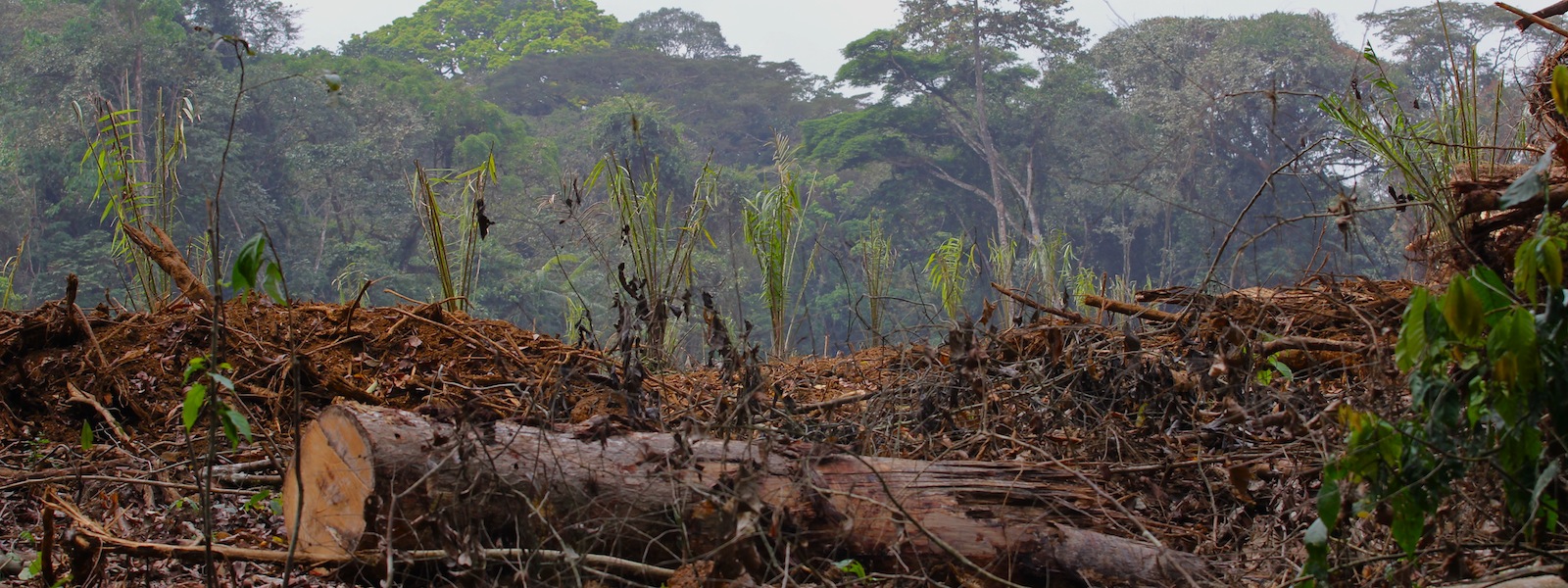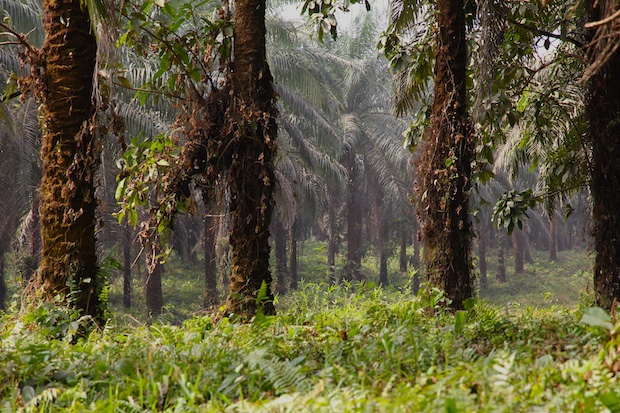Citizens of Congo Basin countries need look no further than Liberia to see what uncontrolled palm oil development looks like. It’s a frightening sight.
Africa’s Vanishing Forests, published on December 4th, describes Liberia’s burgeoning palm oil industry in painful detail. This is not what “development” is supposed to look like.
Writing about the arrival of Singaporean investor, Golden Veroleum (GVL), in Liberia, author Jocelyn Zuckerman describes an all-too-familiar scenario:
– Deals signed without the consent of local communities;
– Community lands seized by the government and handed over to multinational corporations;
– Deforestation leading to extensive environmental damage and social upheaval with villagers deprived of their lands and livelihoods;
– Insufficient compensation, limited employment opportunities and increasing food prices and hunger;
– Corruption running throughout every deal;
– Local attorneys and officials overwhelmed by powerful multinational legal teams;
– Project opponents and journalists harassed and imprisoned.
The list goes on and on.
Zuckerman relates the story of a village called Pluoh, where villager, Benedict Menewah, tells his story:
He described how GVL had shown up with its Caterpillars in the village he’d grown up in and where his father, Smart Williams, still lived. Hearing the sound of machinery, Williams, a 77-year-old with stooped shoulders and clouded blue eyes, had gone to see what was up. Representatives from GVL, a Liberian company whose anchor investor is based in Singapore, asked to see his father’s deed, Menewah said. “We don’t have a deed,” Williams told them, “but this is our land. Where would we get a deed from?” (In fact, very few rural Liberians have physical documentation related to the land their families have inhabited for generations.) “They said the land was for the government,” Williams told me later, “not for us.” The company proceeded to plow under the family’s cassava, yams, and plantains, in addition to the 500 baby rubber trees that Menewah had recently planted with intentions of selling the latex. They disassembled Williams’s home and put the mud bricks on a tractor so he could rebuild elsewhere.
“The bush is our supermarket,” Menewah said, explaining how he used to hunt for small animals as well as gather fruit. “We get everything here. But now they’ve taken it all.” The company gave him a single payment of $340.
Williams was particularly broken up about the two breadfruit trees that his great-uncle had brought back from Ghana in 1922 and which, along with bush meat and “palm cabbage” (finely chopped, tender young palm leaves), had kept the family alive during the long years of fighting. “We lost our auntie, our uncle, our nephew, our niece,” Menewah said, spreading his arms to show me the horizontal scars from where the combatants had tied him up.
The coconut tree had apparently been left, along with the nearby papaya, as a courtesy when the company bulldozed everything else around the graves of Williams’s father and uncle. GVL encircled these with a rickety wooden fence. Whenever he or his father tries to tidy up the way they used to, Menewah said, “the company says we are damaging their property.”
Although Zuckerman underlines the responsibility of the host country governments for making things right (or wrong), she also brings up the important issue of the imbalance of power in these deals:
“Even the government of Liberia does not have the capacity to negotiate with these conglomerates,” (Liberian) attorney Brownell told me. “The government budget this year was $500 million [$553 million, to be exact]. Sime Darby’s is more than $3 billion; Golden Veroleum’s, $1.6 billion. These companies have the top-notch lawyers in the world, the top-notch advisers. The government of Liberia is like an ant when it’s negotiating with these people.”
To make matters worse, Brownell said in reference to the Sime Darby concession, there is little oversight to ensure that citizens’ needs are being met. “You don’t have any person from the government looking over it,” he said. “It’s a state within a state.”
Sime Darby’s head of communications, Carl Dagenhart, speaking by phone from Malaysia, admitted that the company is largely left to its own devices. “Whenever an investor is doing business in a country which has been traumatized to such a degree as Liberia, of course, in many respects we will be a little bit on our own,” he said.
The trend across the region is not encouraging and Liberia stands as an example of what can happen when palm oil is done wrong. Read the whole article here: Africa’s Vanishing Forests
Further reading:
Sime Darby and Land Grabs in Liberia
The Bitter Taste of Liberia’s Palm Oil Plantations
More information at Farmlandgrab.org

